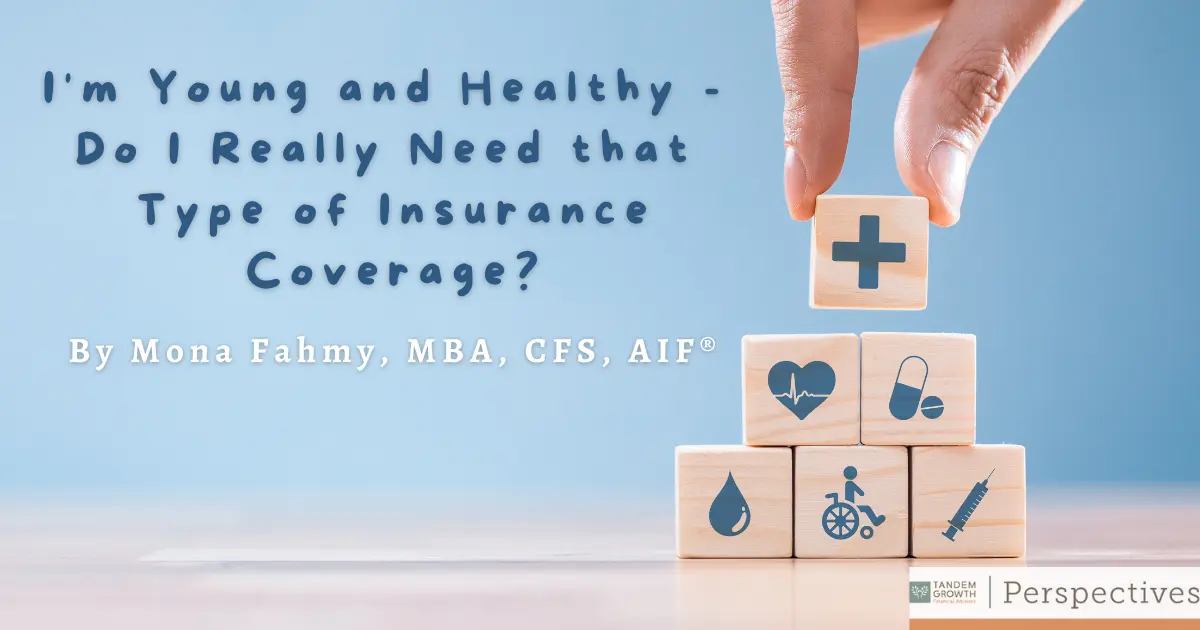
By Mona Fahmy, MBA, CFS, AIF®
When it comes to creating a sound financial strategy, many people think of creating a diversified portfolio or making sure they’re regularly contributing to their retirement plan. But a good financial plan includes insuring against the unexpected.
If you’re younger and have a lot of life ahead of you, you might wonder why you need to consider disability insurance or life insurance. But the point of insurance is to expect the unexpected and make sure that you’ve taken care of yourself and your family if something happens to you.
Each type of insurance has specific coverages and restrictions, and some types of insurance make more sense than others, during various stages of your life. Talk with your financial advisor to ensure that insurance is a part of your strategy.
- Property insurance may take the form of homeowners insurance, renters’ insurance, or insurance against a specific natural disaster, like flood or earthquake insurance. Property insurance typically covers the building itself and the contents within it should something happen. A rental policy will cover your possessions as a renter should something happen to your building. You’ve spent a lifetime building up your possessions; if everything were lost tomorrow, you wouldn’t want to outlay the funds to rebuy everything you own.
- Casualty insurance protects you against claims or lawsuits made against you by outside parties. Casualty insurance is already bundled in if you already have homeowners and auto insurance. For example, if someone falls down deck stairs because you failed to maintain them, the casualty part of your homeowner’s insurance would cover this type of claim. It’s important to note that the maximum casualty insurance available with your homeowners and auto insurance is relatively low so consideration should be given to additional coverage through an umbrella policy.
- Life insurance is a way of providing financial support to your loved ones after you’re gone. You’ll pay a premium, typically monthly or annually, for insurance that will pay a death benefit to your beneficiaries after you’re gone. Death benefit money can be used to pay funeral expenses, mortgage, or rent payments, and day-to-day living expenses. Younger people typically overlook this type of insurance, but life insurance should be a part of everyone’s financial plan.
- Disability insurance protects you if you become disabled and unable to work. It’s helpful to think of disability insurance as insurance for your income. The two types of disability insurance—short-term disability (STD) and long-term disability (LTD)—are typically offered as part of or in addition to your insurance options provided by your employer. STD typically covers periods of injury or disability from 13-26 weeks, while LTD usually offers several years of continuous income replacement after a disability. However, these policies only typically cover a percentage of your previous income. Still, having at least some of your income covered is better than nothing.
- Extended care insurance, sometimes referred to as long-term care insurance, is designed to help cover you as you age and provide in-patient or at-home care for a chronic condition. Extended care insurance can cover nursing homes, assisted living facilities, home health aides, and private-duty nurses. Extended care insurance is also less expensive the younger you are, so if you’re approaching 50, it’s something to start considering.
Insurance is an essential part of your life and financial strategy. By preparing for the worst (while hoping for the best), the hope is you will be better able to handle changes in your life and provide yourself with some protection against significant disasters or illnesses. Remember, you can’t control everything that happens in life, but you can create a plan in an effort to be prepared.
In case you missed it, in our recent Money and Meaning Show podcast, Jeff Bernier welcomed guest Carolyn McClanahan, M.D., CFP®. In the episode titled “Are you ready for the “Big Four” transitions of aging? Jeff and Carolyn discuss some of these insurance coverages. Check it out here: tandemgrowth.com/resources/money-meaning-show.






